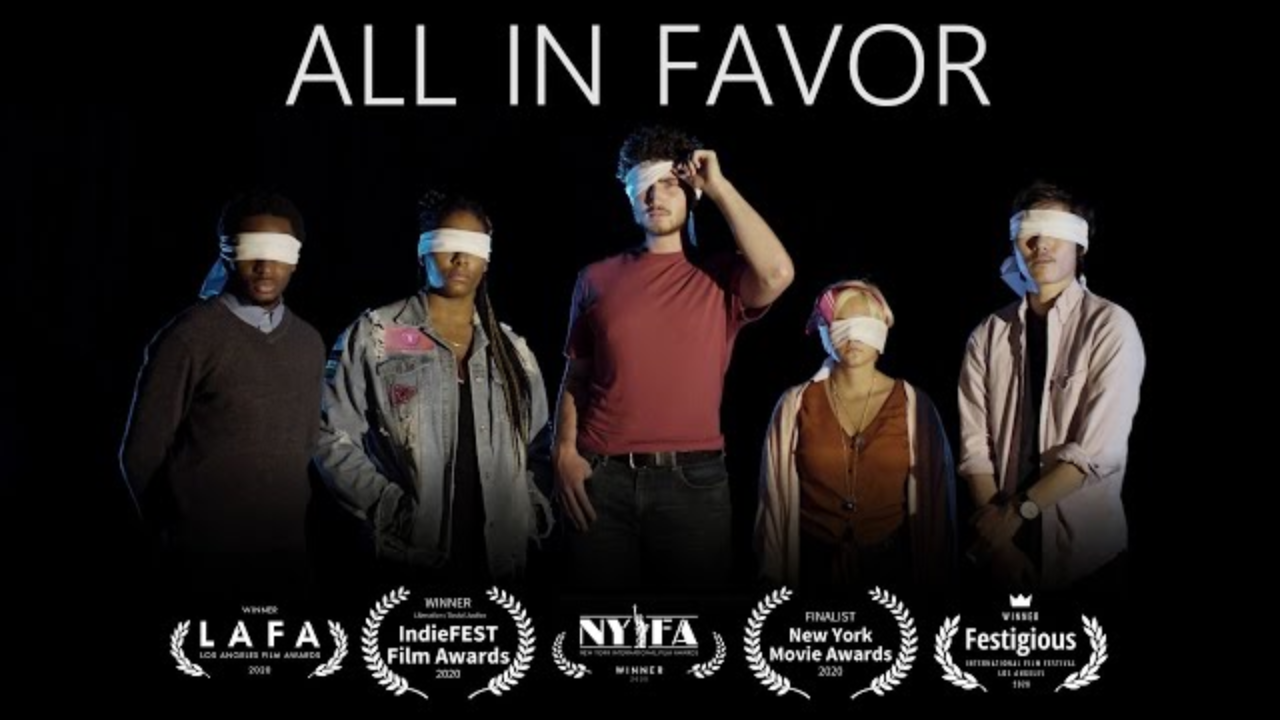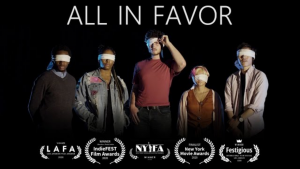
Written By: Matt Hirsch

Created entirely by students in the Television, Radio, and Emerging Media (TREM) program, the series All in Favor has gone on to win awards from five different film festivals, including the New York International Film Awards, the Los Angeles Film Awards, and Indie Fest. Spun off from the TREM web series Unproductive, All in Favor takes a swing at cancel culture and the consequences that surround it. The show follows the Student Voices Committee of Kings Metro College, whose job is to deliberate and vote on a faculty member’s fate after they discovered she made a homophobic tweet a few years prior.
The Committee members all come from different cultural backgrounds and bring several perspectives to the table. Like in Twelve Angry Men, a courtroom drama that partly inspired the show, cooperation was the key to success. It took consideration of every person’s input to come to a unanimous decision on “whether or not the tweet was permissible,” said Gilda McCran, one of the writers of All in Favor.
“I think the meaning of the show is to look at issues while keeping in mind the different communities, viewpoints, and people that are surrounding this issue because everything is intersectional. One issue can affect all these different people and societies. I think it’s important to keep that in mind,” McCran said.
Despite the serious tone of the show, the atmosphere on set was lighthearted. The actors formed a friendship and still speak to each other regularly. Antics like trying to make each other break character or cracking jokes about mating dolphins were common. Malika Parker played Billie, the strong-willed backbone of the group who isn’t afraid to fight for what she believes in. Parker felt the connections she made while filming were her favorite part of the pilot.
“Even though we’re shooting something where the characters constantly have disagreements, we as a cast have not had any. It was always wonderful to go on set and know you have those people in your corner at all times,” said Parker.
By taking inspiration from different eras of cinema and putting them together with a modern twist, the TREM program created a critically acclaimed student production. All in Favor tapped Hollywood Golden Age classics and 80’s hits to use as a blueprint for the pilot.
“When I got the prompt for the season, the way that they described it was,‘Twelve Angry Men meets The Breakfast Club,’ and I’ve seen both of those movies and really enjoy them. So I did keep that in mind throughout the process,” said acting major Lia Hauser, who starred as Olivia, the laid-back foil to Billie’s intensity. She humanized the role by taking traits of her personality to inject into her character. With the help of films that inspired the pilot, she added nuance to Olivia’s personality.
“Like,‘Okay, this is what’s getting mashed together.’ So I tried to hone in on that, ‘I’m representing a stereotype’ sort of thing. Because The Breakfast Club is about people from all these different groups, and that’s similar to what we did with All in Favor. So I was trying to be really mindful of that,” she said.
After the pilot’s accomplishments, All in Favor was set for a second episode, but the pandemic struck, and production ground to a halt. It’s up in the air if the show will continue. The first episode built the world of Kings Metro College and the Committee but didn’t get to flesh out all of the characters.
“With episode two, I felt way more comfortable doing the character,” said Gary Chung, who played Liam, the tech-savvy, analytical member of the bunch. He thought the show’s cancellation was unfortunate because he felt he didn’t hit his stride in the role until the end of filming. Chung, and his co-star Micah Sander, who played the leading role of Matt, initially faced a common struggle.
“Me and Micah were so nervous with the first shootings because we’re not really trained. Everybody else is part of the BFA program. And we really leaned into it towards the end. For episode two, I got a really good understanding of my character and got less robotic and more human. Less one dimensional,” he said.
In contrast to Liam, Sander’s character is a “fish out of water” that was reluctant to join the Committee at first, likening it to jury duty. Eventually, Matt embraces his role as a “juror” and realizes the importance of his responsibility.
“I think that there are people who are truly despicable and deserve what they get; the serial rapists, pedophiles, the people who are going out there with the intention to do bad things. But I think there are other cases where that is not really what happens,” said Sander, who finds that cancel culture has its pros and cons. As All In Favor demonstrates, it’s important to hold people accountable for their actions, but consider forgiveness where it’s due.
“I think that there has to be a culture of forgiveness for the people who are honestly apologizing. Because I think to take on every single tiny case and try to cancel every single person who has done something wrong in the past, it weakens it when somebody does something extremely heinous.”
Unfortunately, due to the pandemic’s uncertainty, the future of All in Favor hangs in the balance. School-wide budget cuts have all but killed the chance for a follow-up to the award-winning pilot.
“It all depends on when we can get back to anything. I think we could have a small enough group to do it, but the problem is not just the virus; it’s the schoolwide cuts that have happened to all the different classes,” said Sander. “So it’s still up in the air whether we can do another season or another episode of All in Favor because of money.”
